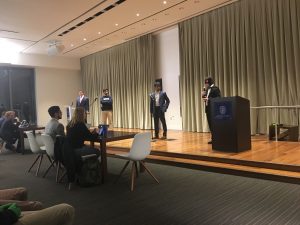Content warning: this article references sexual assault
All the times students have said that “GUSA is a joke” have finally come back to bite us: even the Heckler is running a candidate for GUSA Executive elections. But this election, and the influence of our student leaders, remains serious. After a year of tangible progress under the Blass-Sanchez executive, students deserve successors who can build on their legacy while abolishing GUSA as we know it—rebuilding it to empower other students’ advocacy work.
The two official campaigns on the ballot, unfortunately, consist of GUSA insiders with no clear vision for progress and outsiders who lack knowledge about basic aspects of university life. The Thomas Leonard (COL ’23) and Nirvana Khan (SFS ’24) slate is ultimately disappointing and represents a decaying institution. And we denounce Kole Wolfe (SFS ’24) and Zeke Ume-Ukeje (COL ’24) for running a campaign that is unserious and actively unsafe for students: their few policy proposals are uninformed and their ignorance specifically endangers survivors and immunocompromised students on campus.
But amid the controversy and disappointment these two tickets have generated, one promising write-in campaign caught the Voice’s eye. Last week, the Hoya Editorial Board endorsed a hypothetical progressive, write-in campaign that could earn students’ trust—and we argue the Wiggan/Carder ticket is it.
The Voice Editorial Board is endorsing the write-in Wiggan/Carder slate—the “MO” campaign, as Marcella Wiggan (COL ’23) and Otice Carder (COL ’23) call themselves—for their ability to quickly engage with and learn from student groups, their humility regarding their outsider status, and their delicate treatment of key campus issues. Though they are a last minute, write-in campaign, we believe their unique, ambitious vision for linking GUSA’s work to that of student organizations can build on the progress we have seen this year. We encourage everyone to write-in “MO” for GUSA Executive when voting begins on Thursday, Feb 10.
We base our endorsement on interviews with these three campaigns, their policy platforms, and social media statements by or about them.
The Progressive Newcomers: Marcella Wiggan and Otice Carder
While they only launched their website Sunday night, the MO campaign—they prefer to use their first names, Marcella and Otice, to push back against GUSA’s professionalism—already has an impressive platform. This is a ticket that emphasizes the valuable work of non-GUSA student activists, plans to restructure GUSA in a manner most effective for students, and offers an innovative approach to addressing mental health, Title IX, and workers rights issues.
Marcella and Otice are relatively new to GUSA—Marcella has not worked in GUSA and Carder was just sworn in as a senator last week—but they promised “to call out the administration on their crap.” That’s the right attitude.
The MO campaign centers restorative justice and abolitionist values: their policy proposals emphasize care and engagement over punishment. They want to work to end Georgetown’s punitive sanctions systems, which can deprive students of financial aid. Their mental health platform similarly suggests academic policy changes that would not penalize students for missing classes while addressing their mental health. Similarly, they want to support survivors in a Title IX process that often remains punitive for those coming forward. Otice offered, “current frameworks on campus don’t really provide opportunities for survivors to engage in healing dialogues and facilitated mediations, and so I think that’s important for us to implement.”
The campaign has real ideas of its own, but, more importantly, they are listening to the ideas of established student organizations and activists. “We’re not going to come out here and say that we have all the answers of what’s best for the Georgetown Community,” Marcella stressed. “We literally don’t.”
To remedy their acknowledged lack of experience, they have put significant effort into reaching out to student groups. In just one day of campaigning, they have reached out to groups such as AASA, MEChA, GU Pride, and the GU Coalition for Workers’ Rights to collect community feedback on their campaign. Otice is in the GSP community, Marcella is a member of Mosaic, and both have worked with Georgetown’s Capitol Applied Learning Lab, which works to make unpaid D.C. internships more accessible to students. Marcella praised students who have tangibly improved Georgetown—including outgoing president Nile Blass (COL ’22).
In addition to their policy proposals, the MO campaign has an effective vision for GUSA restructure. Marcella wants to “phase out the Senate and dissolve the culture of professionalism” in GUSA but, overall, they aim to evaluate what changes would actually benefit the wider student body before they jump into a restructuring process. “Professionalism and rigidity are things that we don’t want to bring with us,” Marcella stressed.
They support decentralizing GUSA to work alongside and empower student organizations on campus, many of which do more focused advocacy work than the current Senate does. If their executive gives greater voice to student activists, the long-criticized GUSA Senate will finally become irrelevant. Marcella thinks that “a collaborative environment where people are sharing resources with one another will be really important” for GUSA’s evolution.
That being said, some community activists also sit within GUSA as chairs for policy committees. Because Marcella and Otice are relatively inexperienced in GUSA, we hope they keep on current policy chairs during the transitional period. The longevity of current policy chairs, who are both within GUSA and knowledgeable about issues, will add much-needed weight to their executive and empower groups within the current GUSA structure.
“Especially when it comes to our policies and ideas, there will be so much leaning on other people,” Marcella argued.“Nothing will come from us without coming from everyone.” We fundamentally believe in this vision.
The Dangerous Outsiders: Kole Wolfe and Zeke Ume-Ukeje
Like Marcella and Otice, Wolfe and Ume-Ukeje present themselves as outsiders. But they’re a far more dangerous kind of outsider: the ways in which Wolfe and Ume-Ukeje’s policies and lack of knowledge recklessly endanger immunocompromised students, survivors, and the work of past and current activists makes them uniquely unqualified to even participate in this election. They are the worst GUSA campaign in recent history, and they should be nowhere near student leadership.
When asked about what kinds of COVID-19 policies they would support, Wolfe said, “we are fans of the endemic approach.”
“We don’t think there should be capacity restrictions on anything,” he continued. The Voice cannot endorse a campaign that does not prioritize the needs and safety of immunocompromised students, faculty, and workers.
And when asked why women and survivors can trust Wolfe and Ume-Ukeje to represent their interests given their membership in fraternities, Wolfe demonstrated his complete lack of knowledge. “I just think there should be a body available for people when they feel unsafe to make those claims and hold people accountable,” he said.
Attitudes toward sexual assault and Title IX procedures create barriers to survivors coming forward, and these procedures rarely hold perpetrators accountable. We cannot support candidates who do not exhibit even an elementary knowledge of survivors’ challenges on campus—and we regret not asking them what Title IX actually is.
Perhaps realizing Wolfe’s failure to answer, Ume-Ukeje expressed that their fraternity has “absolutely zero tolerance” for sexual harassment, but proposed no solutions for campus policies. “We’re not women, so we can’t feel that level of frustration,” he said. So, did the Wolfe/Ume-Ukeje campaign reach out to relevant campus advocacy groups to learn more about what issues women and survivors face on campus?
No. When we asked them which student organizations they’ve reached out to for comment on their platform and policies, Wolfe admitted: “Honestly, we haven’t reached out to many organizations, besides the CSJ.” Attempting to save his answer, he continued: “Any student organization is welcome to reach out to us with input, but that hadn’t been on our radar yet. I think our main priority number one is to try and get elected first.”
We pressed them again to list two or three organizations they would want to reach out to. It took them nearly a minute before Ume-Ukeje offered, “we definitely want to reach out to the LGBTQ community; for me personally, reaching out to the Black and African American community.” Finally, after we asked them a third time to name a single student group, Ume-Ukeje mentioned, “We want to reach out to La Casa Latina, which is over there on 36th Street, the Black House, just to name a few. We know where these people are, we know that there are concerns.” The pair was jaw-droppingly unaware of specific issue areas or existing advocacy spaces on campus, both in and outside of GUSA.
This lack of awareness made for some absurd answers. When asked how he would promote anti-racist initiatives on campus, Ume-Ukeje’s answer was incoherent. “Speaking on our antiracism and Title IX policies, I think one of the things we definitely want to do is invite more speakers out to Georgetown.”
“We already do that with senators, congresspeople. Hillary Clinton was here last semester. So we want to make those resources and that availability more accessible for students on campus,” he continued. We were confused—what does Hillary Clinton have to do with antiracism, or Title IX, or anything?
Veering away from the initial question about antiracism, Ume-Ukeje concluded, “we are invested in making a more equitable and a more equal community for all minority groups, the LGBT community, women on Georgetown’s campus, the African American, Latinx, et cetera, et cetera.”
The ticket does not seem connected to student life on campus, considering how little they know. But they present this outsider status as an advantage, as a way to make sure their administration serves everyone on campus. While being an “outsider” to an entrenched system may sound appealing, we cannot endorse a ticket with so little knowledge of the campus communities included in that “et cetera.” We much prefer what the MO campaign offers in this regard: informed outsiders who display humility about what they don’t know and seek to connect to marginalized groups to remedy that lack of knowledge.
Their campaign has faced controversy, too. A formal complaint against the Wolfe/Ume-Ukeje campaign provided video evidence of campaign materials at an event involving alcohol, with the campaign potentially violating the $300 spending limit on the event. The Election Commission has subtracted speaking time from the pair at the election debates for these suspected violations of campaign rules; the Wolfe/Ume-Ukeje campaign responded with a strongly worded statement about Election Commission bias.
Concluding the interview, Ume-Ukeje argued, “To call us unserious is really unfortunate. We don’t agree with that, because we definitely are serious and we do have a lot of plans and a lot of things we know we need to work on.” But Wolfe and Ume-Ukeje gave us no reason to take them seriously.
For their absence of coherent plans and the ways in which their ignorance endangers marginalized groups, we do not think Georgetown students should take them seriously. It is our sincere hope that they receive few, if any, votes in the election.
The Lackluster Insiders: Thomas Leonard and Nirvana Khan
For two students with considerable GUSA experience—Leonard now serves as GUSA vice president, Khan as policy and advocacy chair—the policies they propose are incredibly vague. Compared to what the Blass/Sanchez ticket proposed last year, the Leonard/Khan ticket has little new to offer.
To be sure, Leonard and Khan are aware of what campus issues they want to tackle. Khan described her work on the GU Coalition for Workers’ Rights, and Leonard stressed his work with Dr. Ranit Mishori, Georgetown’s public health officer, on Georgetown’s COVID-19 response protocols. Khan spoke strongly in favor of establishing an AAPI affinity house on campus. Both agreed that GUSA should support mutual aid efforts more. Leonard and Khan know how GUSA works, and they have the administrative and community connections necessary to run a student organization that builds on the tangible accomplishments of the Blass/Sanchez administration.
But that’s probably the most they can do. We heartily agree with the Hoya Editorial Board’s opinion that the Leonard/Khan campaign’s policy proposals “merely state the obvious with no actual guidelines for implementation.” When presented with questions about their specific policies, Leonard and Khan often deferred to their need to learn more, and presented little in the way of concrete ideas.
We agree that learning more from students is absolutely necessary; but it is strange that their experience as the “insider” campaign has not translated into more tangible, unique policy suggestions.
Asked what he would do to support mental health on campus, Leonard said their strategy involves “looking alongside [sic] our academic university and student policies to get an idea of the underlying root causes of our mental health crisis on campus and working alongside other student groups and within GUSA to address those concerns.” We are not sure what this means.
One would assume that these two GUSA veterans would know what resources CAPS needs, or what the possible root causes of our campus’s mental health crisis could be. But we found no substance here, and didn’t find much when we asked them about other issues, either. The few policies they have posted on Instagram have some helpful details, but the policies on their website remain similarly insubstantial.
Uniquely, Leonard and Khan expressed support for making GUSA a physical presence on campus that can apply influence beyond letters to the university and petitions. But Leonard’s excitement for expanding GUSA’s activism work was not backed up with substantive ideas: “the student body wants to know what we’re going to do, and we are going to show them what we’re going to do, and we do generally hope that they’ll be a key part of making sure that we’re able to do what we do.” It sure would be nice to know what they want to do.
Even if we give them the benefit of the doubt on their policy knowledge, we are not confident they can successfully implement any policy given the controversies surrounding their campaign. Public announcements by other GUSA members argue that their campaign relies on policies implemented by other students, leading the campaign to make an official apology. The fracas reveals that neither Leonard nor Khan resolved their personal issues with their fellow GUSA members before they launched their campaign; that neglect does not bode well for the future of any collaborative, student-input centered administration they aim to build.
At the end of the day, Leonard and Khan are longtime GUSA members who, on balance, will not do horribly. But their ability to engage in policy making, or even to inspire enthusiasm with a coherent, values-based approach like the MO campaign does is sorely lacking. They’ll do all right, but all right isn’t enough.
The Student Government Students Deserve
The Voice expects a lot from our endorsed ticket: Marcella Wiggan and Otice Carder, the MO campaign. They have given us multiple reasons to believe that, despite their GUSA inexperience, they are connected to students in ways that Wolfe/Ume-Ukeje and Leonard/Khan are not.
We call on Marcella and Otice to learn as much as they can from current GUSA policy chairs about the university’s most pressing issues. Despite its many shortcomings, GUSA members still hold a wealth of information that the MO slate ought to tap into. With this knowledge in hand, they can more effectively carry out their promise to decentralize GUSA and abolish the Senate while elevating student groups. We hope that Marcella and Otice pursue and develop their restructuring vision if elected.
The MO campaign was organized at the last minute after Marcella and Otice realized that the existing tickets did not generate enthusiasm among their peers. Within 24 hours, they connected with various student groups to build a collaborative platform that continues to grow. Their ability to organize quickly at the last minute is rare, and commendable, but this collaborative effort of theirs should not be a one-time event. If elected, they will need to follow through with due diligence to gain the trust and feedback of students within and outside GUSA. We call on Marcella and Otice to continue their impressive, fast-paced organizing streak this week with consistent, hard work if their campaign succeeds.
And we believe they should succeed. Though the MO campaign is still in the process of developing their ideas, they have the right values. The uncertainties we have about their campaign are real, but the dullness of the other available options makes Marcella and Otice shine in comparison.
When ballots open Thursday, write in “MO” for GUSA Executive.
Correction: A previous version of the article did not describe the full nature of the alleged Wolfe/Ume-Ukeje campaign violation, and has been amended to reflect that neither candidate was proven to be physically present at the violating event







test
wow yes totally agree ❤️
omg yes queen!